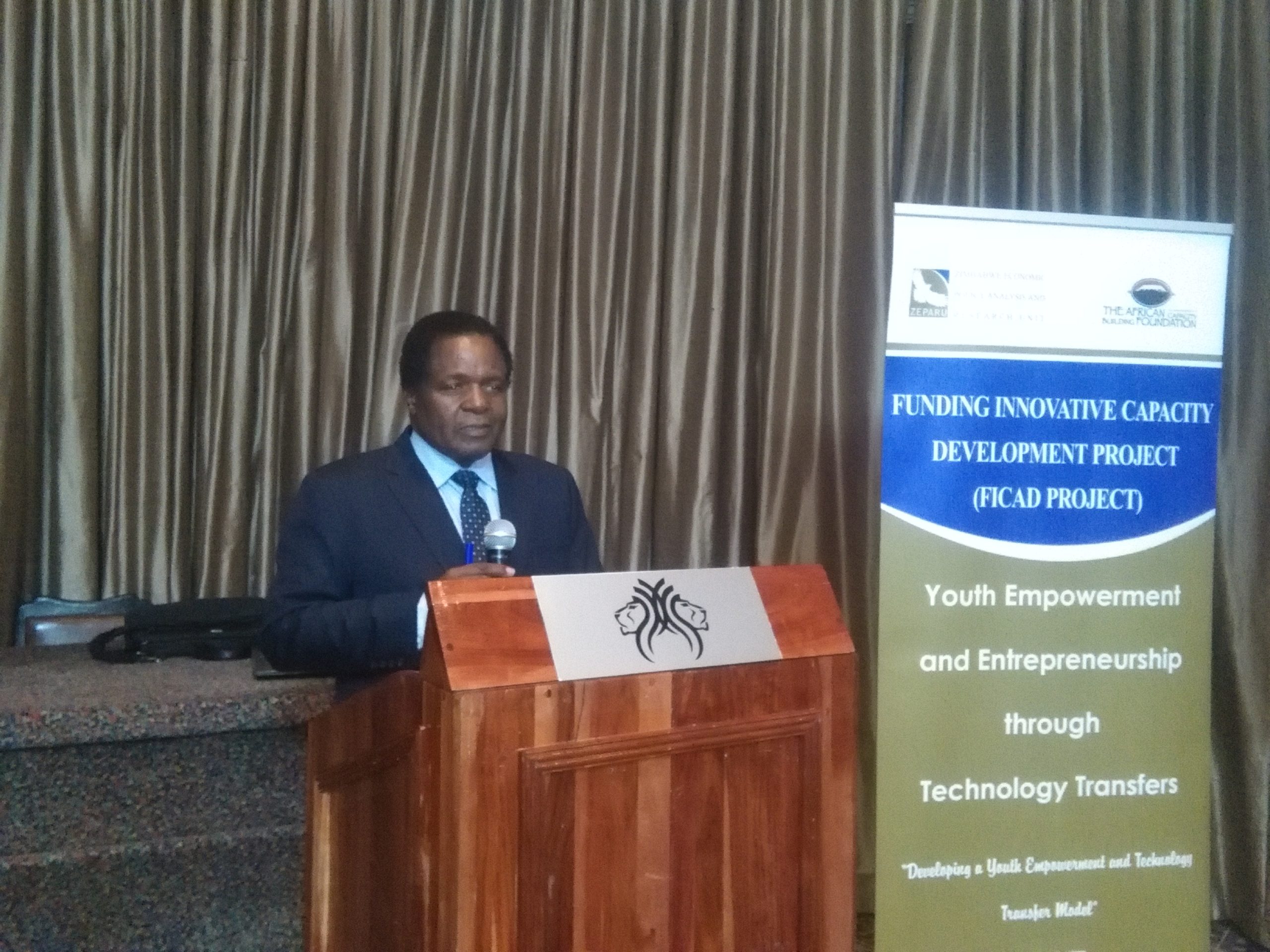By Byron Mutingwende
The government is fostering the development of entrepreneurship among the youths through a technology transfer programme.
In his address at the Funding Innovative Capacity Development (FICAD) project spearheaded by the African Capacity Building Foundation (ACBF) and the Zimbabwe Economic Policy Analysis and Research Unit (ZEPARU), Dr. Desire Mutize Sibanda, the Permanent Secretary in the Ministry of Youth, Indigenisation and Economic Empowerment said entrepreneurship promotes economic growth.
“I should underline that our focus as a ministry is to create employers. Entrepreneurs, small businesses, and the informal sector players have a role to play in moving the nation forward. In the absence of entrepreneurship, there will be no economic growth,” Sibanda said.
Entrepreneurship is an individual’s ability to turn ideas into action, to be innovative, take the initiative, take risks, plan and manage business with a view of achieving profits. It is an act and art of being an entrepreneur or one who undertakes innovations.
Dr. Sibanda said the government has been calling for the development of entrepreneurship among the youth to sustain them.
“Entrepreneurship development among the youths requires that all stakeholders work together and the business world should be actively involved as mentors, coaches or simply to share their business experience. The ability of our economy to successfully meet the global challenges of competitiveness and inclusive growth depends on a dynamic internal Zimbabwean spirit of entrepreneurship,” he said.
The youths (both young men and women) are the majority in the country and need special treatment in terms of the youth demographic dividend. The Ministry of Youth is rolling out a robust youth economic development plan to enable youths to effectively participate in the command agriculture. It is also acquiring capital and equipment for youths in mining. The youth empowerment bank is also being set up to assist young people with access to loans and lines of credit.
“The bank will be efficiently run and should not repeat past mistakes of loaning people who had no business management training and experience. We shall be inviting youths from the diaspora to partner with our youths to invest in profitable projects. Zimbabwe has over 2, 5 million people outside the country, most of them young people,” Sibanda added.
The ministry will also be considering economic zones for youth hi-tech industries to value add products in the rural areas and create jobs. Ministries and local authorities are encouraged to have youth desks to promote youth investment and coordination.
In 2016 ZEPARU’s was awarded a Grant by ACBF to undertake a pilot project on Youth Empowerment and Entrepreneurship through Technology Transfer. The FICAD grant is catalytic funding to implement innovative projects and support innovative ideas within a quick turn-around period. The facility is intended to provide short-term financing. Graduate trainees were given $250 per month for them to get exposure to industrial technology. The project was mutually beneficial to the trainees and the firms.
Speaking about the project, Dr. Gibson Chigumira, the Executive Director of ZEPARU said the pilot intervention sought to develop appropriate youth empowerment and entrepreneurship models through technology transfer models for Zimbabwe.
“The FICAD projects had many objectives. It was meant to promote technology transfer and adoption; facilitate linkages between firms, youth, technology suppliers, funders and investors and to contribute to knowledge on alternative and innovative models of youth empowerment.
He added that it sought to empower the selected youth with entrepreneurial and technological skills; to assess the relevance and effectiveness of existing technology training and manpower development programs; and to match skills of trained and unemployed youths to appropriate technology in the industries.
Commenting on the project, Varaidzo Kudenga, the General Manager of Clarson and Company the project was an excellent initiative as it has moved the youths’ mindset from striving to be an employee to be an entrepreneur – something lacking in Zimbabwe at the moment.
“I commend ZEPARU for this programme and ACBF for the funding. It would be nice to see more of these in the future. At my company I had six interns and I came across some brilliant minds whom we can not let go to waste as a nation,” Kudenga said.
Arnold Tamuka Midzi, a graduate engineer, was offered internship by Cernol Chemicals under the FICAD project after graduating in 2014. He had been unemployed ever since graduation and was grateful for having acquired experience from the internship and looked forward to be employed full time when an opportunity arises within the firm.
“I gained many skills during my stint at Cernol Chemicals. I now know how to manufacture different types of chemicals. I have gained skills on quality control systems and production planning just to mention a few,” Midzi said.
Milton Gavhure, the Technical Training Manager of Zimphos (producer of phosphate fertilizer) said employers expect young graduate trainees to demonstrate a range of skills that include teamwork, communication, leadership, critical thinking, problem solving and managerial abilities or potential.
“Employers get frustrated when higher education courses do not meet their needs. So from time to time, let’s review the curriculum. The issue of transferrable skills is important to our country. Training institutions should assess their own programmes to determine the extent to which students graduating from these programmes are likely to satisfy employer requirements,” Gavhure said.
Nobert Shoriwa, the Finance Director of Precision Grinders weighed in by saying his company benefitted a lot in terms of research and development since the interns brought in ideas on improving threshers, shellers and dehullers used as grinding mills.
Professor Lilian Tichagwa, the Chairperson of the Polymer Technology and Engineering Department of the Harare Institute of Technology said the initiative gives graduates hands-on experience which when blended with the theory learnt from tertiary institutions, would help in growing industries and the economy at large.






